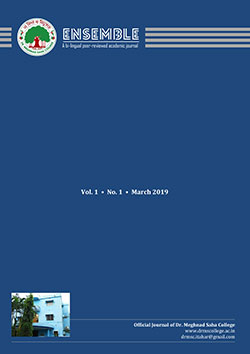PANDEMIC-INDUCED LOCKDOWN’S SHOCK TO HOUSEHOLD LEVEL FOOD SECURITY
Abstract:
The impact of the lockdown induced by the COVID-19 pandemic was devastating for the farm as well as the non-farm sectors of the Indian economy. Even though many authors expressed the apprehensions of hunger, and journalistic accounts of hunger appeared in newspapers, very few studies were undertaken to investigate the nature and extent of lockdown-induced food insecurity experienced by the households and understand the household management strategies adopted by those households. This study was undertaken in a village located in the Birbhum district of West Bengal during the unlock-I phase to fill the above-stated gap. Data for this study were collected from 40 households using a standardized tool known as the Household Food Insecurity Access Scale (HFIAS), and a semi-structured questionnaire. Results showed that inaccessibility of food was experienced by the households in three domains- anxiety and uncertainty (82.5% households), unsatisfactory quality (100% households), and insufficient quantity (77.5% households). However, quantitative scale scores of food insecurity showed that none of the households experienced the highest possible degree of food insecurity. The public distribution system and mid-day-meal programs were most effective in reducing the food insecurity of many families, but the level of support extended was not enough. More than half of the households reported a reduction in animal protein consumption, higher expenditure on vegetables and fruits, and an increase in taking loans. Based on the findings of the study, two specific suggestions were provided for facilitatingthe management of disruptions caused by lockdown-like emergency conditions.
Keywords: Consumption Pattern, Covid-19, Expenditure Pattern, Hunger, Mid-Day-Meal, Public Distribution System, Unemployment, Unlock, West Bengal
https://doi.org/10.37948/ensemble-2021-sp1-a014
Views: 2613



